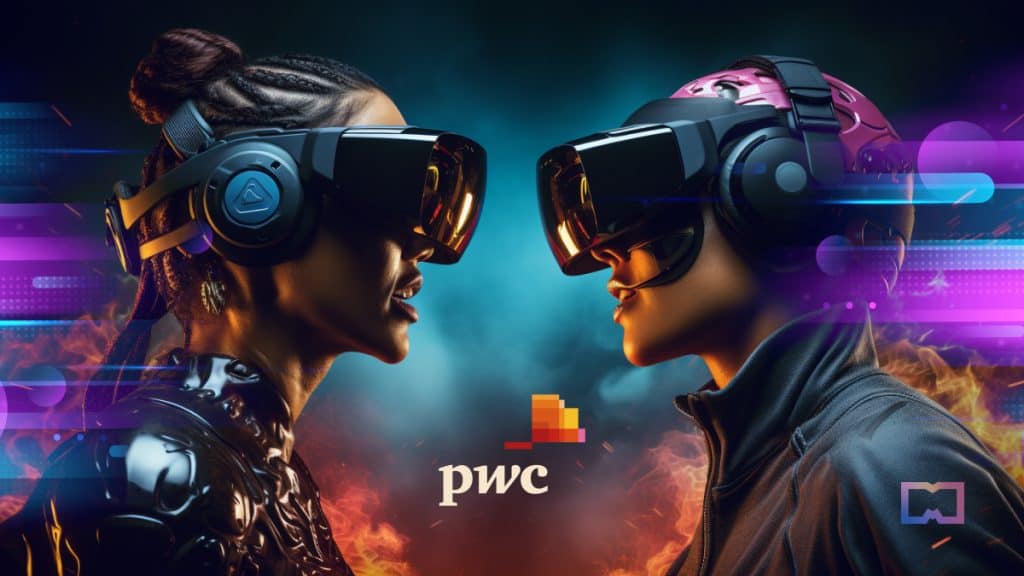Virtual Reality Superior Than Video Conferencing for Remote Work Collaboration: PWC Report


In Brief
A recent study by PwC unveiled a compelling shift towards VR as a superior tool for remote collaboration.
The findings reinforce the potential of VR in bolstering team collaboration, especially in remote work settings.

In today’s modern era of remote work, the traditional landscape of digital meetings and workshops is undergoing a significant transformation. Video conferencing has traditionally been the cornerstone of long-distance communication. But recent advances in virtual reality (VR) technology have sparked an increasing interest in enhancing the way of collaborative work experiences.
A recent study conducted by PwC in partnership with the Ministry of Internal Affairs in Lower Saxony, Germany and the University of Münster, unveiled a compelling shift towards VR as a superior tool for remote collaboration.
It was found that for resilient modern workforces, capable of working effectively and collaboratively in a remote environment following the disruptions caused by the global pandemic, immersive technologies such as VR hold the key to unlocking new dimensions of collaboration.
“Following the pandemic, modern workforces must be resilient against the next major disruption and find ways to work more effectively with one another remotely. Immersive technologies unlock new and powerful dimensions of collaboration.” said André Henke, Ministry of Internal Affairs Lower Saxony, Germany — in a statement.
The Transformative Impact of VR on Team Collaboration
The results of the study presented significant insights into the effectiveness of VR as a collaborative medium when contrasted with conventional video conferencing. It revealed a 58% increase in participants’ sense of closeness to their colleagues when using VR. This underscores VR’s potential to foster team cohesion, particularly in remote work scenarios. Additionally, there was a 16% boost in communication, signifying a clearer exchange of ideas and information in VR environments. The results also indicated an 11% uptick in satisfaction with workshop outcomes, hinting at the immersive nature of VR leading to more productive sessions.
“Immersive Technologies will change the way we collaborate and interact. It is great to see these data points that underline the potential value already today. It is important to understand that as the technology keeps evolving, we can expect the value to increase,” Philipp Sostmann, Senior Manager of Immersive Technologies at PwC Switzerland told Metaverse Post.
The findings reinforce the potential of VR in bolstering team collaboration, especially in remote work settings. Of particular interest was the fact that, despite common perceptions of VR headsets being inconvenient, users reported a 15% increase in comfort during VR meetings compared to traditional video conferencing. This suggests that the discomfort associated with the physical hardware is offset by the psychological comfort offered by the anonymity of a digital avatar, making VR meetings less intrusive than the constant exposure of a video call.
“Overall, findings from our studies show that meetings in the enterprise metaverse can benefit from the unique characteristics of VR technology,” said Prof. Dr. Thorsten Hennig-Thurau from the University of Münster.
However, while the advantages of VR for remote collaboration are evident, the study also revealed a contrasting data point — a 20% increase in participant exhaustion among those using VR as compared to traditional video conferencing. This can be attributed to the immersive nature of VR, which demands a different level of cognitive and sensory engagement.
PwC said that the choice between virtual reality and video conferencing depends on the specific requirements of the scenario. For simple presentations or one-way dialogues, video conferencing remains efficient and practical. In contrast, for remote workshops necessitating deeper engagement and interaction, VR offers a more immersive, connected and productive solution. The company said that a comprehensive report encompassing the complete study dataset will be released soon, providing a deeper insight into the study’s implications.
As VR technology continues to evolve, the challenges associated with its integration are expected to decrease, indicating a promising future for its adoption in modern workplaces.
Disclaimer
In line with the Trust Project guidelines, please note that the information provided on this page is not intended to be and should not be interpreted as legal, tax, investment, financial, or any other form of advice. It is important to only invest what you can afford to lose and to seek independent financial advice if you have any doubts. For further information, we suggest referring to the terms and conditions as well as the help and support pages provided by the issuer or advertiser. MetaversePost is committed to accurate, unbiased reporting, but market conditions are subject to change without notice.
About The Author
Victor is a Managing Tech Editor/Writer at Metaverse Post and covers artificial intelligence, crypto, data science, metaverse and cybersecurity within the enterprise realm. He boasts half a decade of media and AI experience working at well-known media outlets such as VentureBeat, DatatechVibe and Analytics India Magazine. Being a Media Mentor at prestigious universities including the Oxford and USC and with a Master's degree in data science and analytics, Victor is deeply committed to staying abreast of emerging trends. He offers readers the latest and most insightful narratives from the Tech and Web3 landscape.
More articles

Victor is a Managing Tech Editor/Writer at Metaverse Post and covers artificial intelligence, crypto, data science, metaverse and cybersecurity within the enterprise realm. He boasts half a decade of media and AI experience working at well-known media outlets such as VentureBeat, DatatechVibe and Analytics India Magazine. Being a Media Mentor at prestigious universities including the Oxford and USC and with a Master's degree in data science and analytics, Victor is deeply committed to staying abreast of emerging trends. He offers readers the latest and most insightful narratives from the Tech and Web3 landscape.


















































